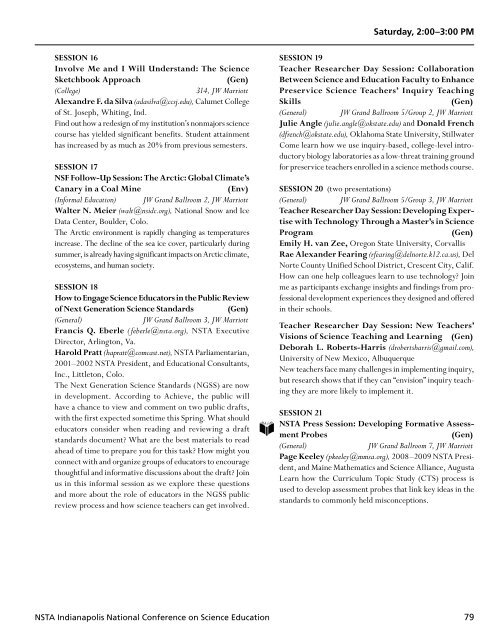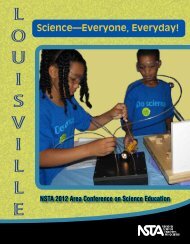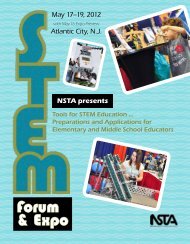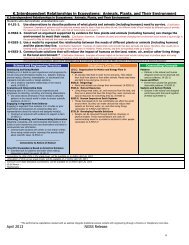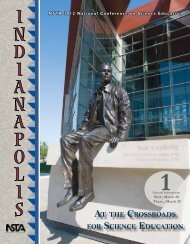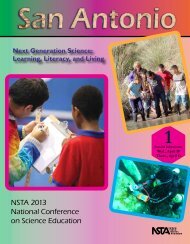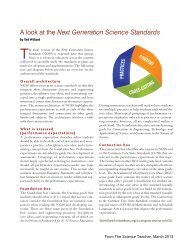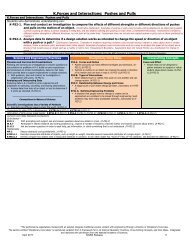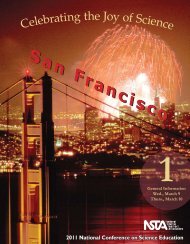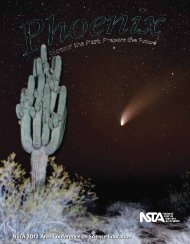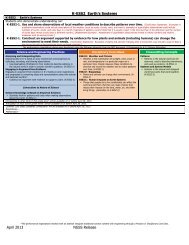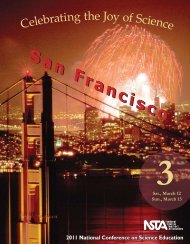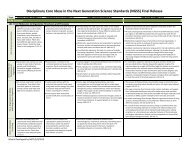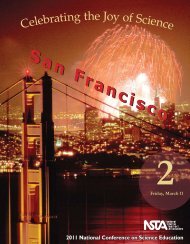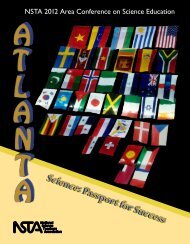Saturday/Sunday
Saturday/Sunday
Saturday/Sunday
Create successful ePaper yourself
Turn your PDF publications into a flip-book with our unique Google optimized e-Paper software.
<strong>Saturday</strong>, 2:00–3:00 PM<br />
SESSION 16<br />
Involve Me and I Will Understand: The Science<br />
Sketchbook Approach<br />
(Gen)<br />
(College)<br />
314, JW Marriott<br />
Alexandre F. da Silva (adasilva@ccsj.edu), Calumet College<br />
of St. Joseph, Whiting, Ind.<br />
Find out how a redesign of my institution’s nonmajors science<br />
course has yielded significant benefits. Student attainment<br />
has increased by as much as 20% from previous semesters.<br />
SESSION 17<br />
NSF Follow-Up Session: The Arctic: Global Climate’s<br />
Canary in a Coal Mine<br />
(Env)<br />
(Informal Education) JW Grand Ballroom 2, JW Marriott<br />
Walter N. Meier (walt@nsidc.org), National Snow and Ice<br />
Data Center, Boulder, Colo.<br />
The Arctic environment is rapidly changing as temperatures<br />
increase. The decline of the sea ice cover, particularly during<br />
summer, is already having significant impacts on Arctic climate,<br />
ecosystems, and human society.<br />
SESSION 18<br />
How to Engage Science Educators in the Public Review<br />
of Next Generation Science Standards (Gen)<br />
(General)<br />
JW Grand Ballroom 3, JW Marriott<br />
Francis Q. Eberle (feberle@nsta.org), NSTA Executive<br />
Director, Arlington, Va.<br />
Harold Pratt (hapratt@comcast.net), NSTA Parliamentarian,<br />
2001–2002 NSTA President, and Educational Consultants,<br />
Inc., Littleton, Colo.<br />
The Next Generation Science Standards (NGSS) are now<br />
in development. According to Achieve, the public will<br />
have a chance to view and comment on two public drafts,<br />
with the first expected sometime this Spring. What should<br />
educators consider when reading and reviewing a draft<br />
standards document What are the best materials to read<br />
ahead of time to prepare you for this task How might you<br />
connect with and organize groups of educators to encourage<br />
thoughtful and informative discussions about the draft Join<br />
us in this informal session as we explore these questions<br />
and more about the role of educators in the NGSS public<br />
review process and how science teachers can get involved.<br />
SESSION 19<br />
Teacher Researcher Day Session: Collaboration<br />
Between Science and Education Faculty to Enhance<br />
Preservice Science Teachers’ Inquiry Teaching<br />
Skills<br />
(Gen)<br />
(General) JW Grand Ballroom 5/Group 2, JW Marriott<br />
Julie Angle (julie.angle@okstate.edu) and Donald French<br />
(dfrench@okstate.edu), Oklahoma State University, Stillwater<br />
Come learn how we use inquiry-based, college-level introductory<br />
biology laboratories as a low-threat training ground<br />
for preservice teachers enrolled in a science methods course.<br />
SESSION 20 (two presentations)<br />
(General) JW Grand Ballroom 5/Group 3, JW Marriott<br />
Teacher Researcher Day Session: Developing Expertise<br />
with Technology Through a Master’s in Science<br />
Program<br />
(Gen)<br />
Emily H. van Zee, Oregon State University, Corvallis<br />
Rae Alexander Fearing (rfearing@delnorte.k12.ca.us), Del<br />
Norte County Unified School District, Crescent City, Calif.<br />
How can one help colleagues learn to use technology Join<br />
me as participants exchange insights and findings from professional<br />
development experiences they designed and offered<br />
in their schools.<br />
Teacher Researcher Day Session: New Teachers’<br />
Visions of Science Teaching and Learning (Gen)<br />
Deborah L. Roberts-Harris (drobertsharris@gmail.com),<br />
University of New Mexico, Albuquerque<br />
New teachers face many challenges in implementing inquiry,<br />
but research shows that if they can “envision” inquiry teaching<br />
they are more likely to implement it.<br />
SESSION 21<br />
NSTA Press Session: Developing Formative Assessment<br />
Probes<br />
(Gen)<br />
(General)<br />
JW Grand Ballroom 7, JW Marriott<br />
Page Keeley (pkeeley@mmsa.org), 2008–2009 NSTA President,<br />
and Maine Mathematics and Science Alliance, Augusta<br />
Learn how the Curriculum Topic Study (CTS) process is<br />
used to develop assessment probes that link key ideas in the<br />
standards to commonly held misconceptions.<br />
NSTA Indianapolis National Conference on Science Education<br />
79


